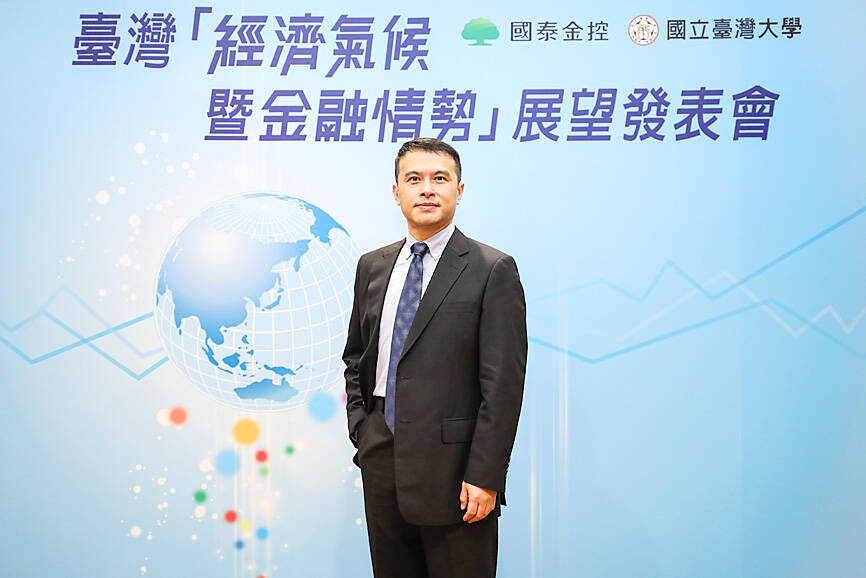Taiwan faces stagflation risk as economic growth this year is expected to slow while inflation remains high, Cathay Financial Holding Co (國泰金控) said yesterday.
A research team commissioned by Cathay Financial said that GDP this year would rise 1.8 percent year-on-year, down from its previous estimate of 2.3 percent, given weaker global demand.
The team, headed by National Central University economics professor Hsu Chih-chiang (徐之強), forecast that inflation would increase 2 percent this year.

Photo courtesy of Cathay Financial Holding Co
“This year’s GDP growth could be slower than inflation, which could be a sign of stagflation,” Hsu told a news conference in Taipei.
Although there is no strict definition of stagflation in which slow economic growth and high inflation coexist, Hsu said what worries them most is that this year’s projected GDP growth of 1.8 percent would be only half of the average growth of 3.6 percent over the past 12 years, while a forecast inflation of 2 percent would be double the average of 1 percent over the same period.
Taiwan’s GDP contracted 0.41 percent annually last quarter and is predicted to fall 1.2 percent this quarter, the Directorate-General of Budget, Accounting and Statistics has said.
If Taiwan enters stagflation, it would be the worst since the 2008 global financial crisis, Hsu said.
In the past, policymakers lowered interest rates to address stagflation, but such an approach would not work when inflation is severe, Cathay Financial economic research department assistant manager Achilles Chen (陳欽奇) said.
With high inflation persisting, the central bank is unlikely to cut rates anytime soon, Hsu said.
The research team predicted that the central bank would raise rates again in the second or third quarter following a 0.125 percentage point hike last week, he said.
“We think the central bank would address the inflation issue first and continue its rate hikes, despite slowing GDP growth,” Chen said.
Cathay Financial expects private consumption to drive the growth momentum this year, rising 4.3 percent this year, as people resume consumption after the COVID-19 pandemic.
The other three pillars of GDP — investment, government spending and net exports — could post slower growth, because of a high comparison base last year and sluggish global demand, the company said.

‘SWASTICAR’: Tesla CEO Elon Musk’s close association with Donald Trump has prompted opponents to brand him a ‘Nazi’ and resulted in a dramatic drop in sales Demonstrators descended on Tesla Inc dealerships across the US, and in Europe and Canada on Saturday to protest company chief Elon Musk, who has amassed extraordinary power as a top adviser to US President Donald Trump. Waving signs with messages such as “Musk is stealing our money” and “Reclaim our country,” the protests largely took place peacefully following fiery episodes of vandalism on Tesla vehicles, dealerships and other facilities in recent weeks that US officials have denounced as terrorism. Hundreds rallied on Saturday outside the Tesla dealership in Manhattan. Some blasted Musk, the world’s richest man, while others demanded the shuttering of his

TIGHT-LIPPED: UMC said it had no merger plans at the moment, after Nikkei Asia reported that the firm and GlobalFoundries were considering restarting merger talks United Microelectronics Corp (UMC, 聯電), the world’s No. 4 contract chipmaker, yesterday launched a new US$5 billion 12-inch chip factory in Singapore as part of its latest effort to diversify its manufacturing footprint amid growing geopolitical risks. The new factory, adjacent to UMC’s existing Singapore fab in the Pasir Res Wafer Fab Park, is scheduled to enter volume production next year, utilizing mature 22-nanometer and 28-nanometer process technologies, UMC said in a statement. The company plans to invest US$5 billion during the first phase of the new fab, which would have an installed capacity of 30,000 12-inch wafers per month, it said. The

MULTIFACETED: A task force has analyzed possible scenarios and created responses to assist domestic industries in dealing with US tariffs, the economics minister said The Executive Yuan is tomorrow to announce countermeasures to US President Donald Trump’s planned reciprocal tariffs, although the details of the plan would not be made public until Monday next week, Minister of Economic Affairs J.W. Kuo (郭智輝) said yesterday. The Cabinet established an economic and trade task force in November last year to deal with US trade and tariff related issues, Kuo told reporters outside the legislature in Taipei. The task force has been analyzing and evaluating all kinds of scenarios to identify suitable responses and determine how best to assist domestic industries in managing the effects of Trump’s tariffs, he

Taiwan’s official purchasing managers’ index (PMI) last month rose 0.2 percentage points to 54.2, in a second consecutive month of expansion, thanks to front-loading demand intended to avoid potential US tariff hikes, the Chung-Hua Institution for Economic Research (CIER, 中華經濟研究院) said yesterday. While short-term demand appeared robust, uncertainties rose due to US President Donald Trump’s unpredictable trade policy, CIER president Lien Hsien-ming (連賢明) told a news conference in Taipei. Taiwan’s economy this year would be characterized by high-level fluctuations and the volatility would be wilder than most expect, Lien said Demand for electronics, particularly semiconductors, continues to benefit from US technology giants’ effort